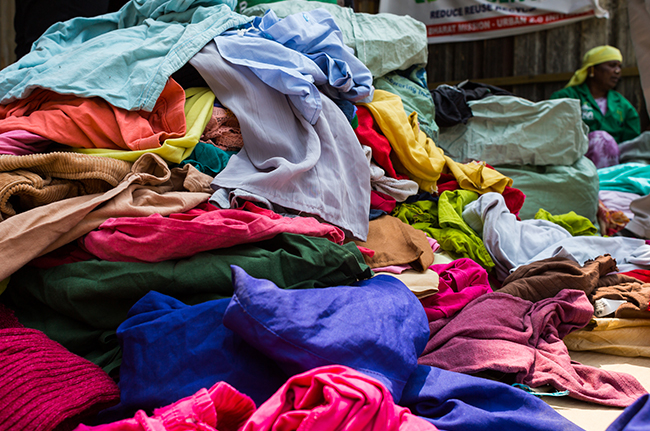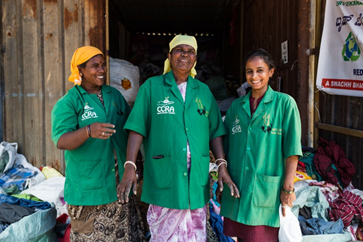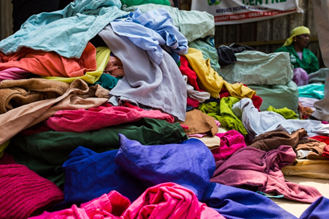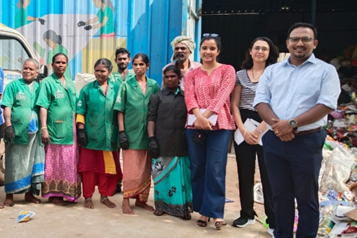Closing the Loop on Textile Waste in India

Clients
IKEA Foundation, H&M Foundation, Alwaleed Philanthropies
Geography of work
India
Sector
Textile & Apparel, Circular Economy
Situation/Challenge
Fashion accounts for up to 10% of global carbon dioxide emission (more than international flights and shipping combined) and creates 15 million tons of apparel waste globally per year, of which 85% of textile waste ends in landfills or incinerated. Only 13% of input material is in some way recycled after usage – less than 1% of this is recycled into new clothing. Furthermore, the Textile & Apparel (T&A) industry does not score well in terms taking care of its most vulnerable workers: An estimated 75 million people employed by the industry globally are working under unfavorable conditions . Health and safety measures are often neglected, and exploitation is common. These working conditions especially affect women, who comprise 80% of those employed by the sector.
With India being one of the top five (5) T&A producing countries and the largest cotton producer worldwide, these issues are especially prevalent in the country and the situation is likely to worsen with growing textile demand. India lacks a formal infrastructure for collection, segregation and sustainable re-use or disposal of textile, which is crucial to move towards a circular T&A industry. Around 80% of domestic textile waste is ending up in landfills, polluting the earth and causing toxic gas emissions.
The gaps in the system are:
- Lack of transparency and cooperation in the value chain
- Lack of an earning model for waste workers to collect and sort textile waste
- Lack of local and scalable solution providers for full circular textile to textile processing
- Market linkage gap between domestic waste and recyclers / other solution providers
- Limited design for inclusive jobs
Solution:

Our solution to this problem is to establish an integrated circular textile waste management model (CTWM) in partnership with grassroots organizations, to (i) prevent textile waste from going to landfill (ii) create sustainable business models to grassroots waste enterprises to take up textile waste management as a business line (iii) create dignified green jobs for waste workers. As an ecosystem-builder, our role is to build capacities and capabilities of grassroots partners, waste entrepreneurs and waste workers in textile waste handling and management and unlocking access to market linkages.
We designed and are implementing a multi-year program called ‘Closing the Loop on Textile Waste’ in partnership with Enviu, our venture building partner, to establish the CTWM model in India. During the initial SEED phase we set the foundation of the CTWM model through piloting in Mumbai and Bengaluru. The following SUPPORT phase aims to replicate the CTWM model based on the learning from the SEED phase. In the SCALE phase the model will be scaled across ~15 cities in India. We are currently executing the SUPPORT phase and are replicating the model in 9 cities with 7 grassroots partners.
Outcome and Impact

As of April 2024
- Diverted ~450,000 kg of textile waste from going to landfills
- Onboarded 22 waste entrepreneurs, built capacity of ~700 waste workers
- 15-20% increase in average income of waste workers who are part of the program
Key Learning:

- Factoring for nuanced differences across cities still merits the need to leverage existing infrastructure and rules of engagement to enable replicability and scalability (for e.g. Waste Management Enterprises in Kerala are the lever for change while they operate with SHGs for waste collection, where as in Bengaluru, the DWCC’s are the lever for change while they operate with and employ waste workers for the same jobs)
- Designing for and ensuring in-market immersion by private sector stakeholders (like recyclers) ensures quick adoption and bridges gaps in market expectations
- Activating market-linkages locally (read as closer to source or origination of waste) is critical to ensure quicker viability (reduced logistic costs) as well as long-term sustainability (reduced CO2 footprint)
Testimonials:
– Nadira, Textile Waste Sorter, Green Worms TRF, Kerala – added that “I cherish the camaraderie with my female colleagues at TRF. The work hours are flexible and the TRF facility is close to my home. And I am now earning triple of what I was earning before. I definitely aspire to continue in textile waste management”
Sunil Chandak, Program Manager, Ecosattva added that “The textile waste business has the potential to not only contribute to environmental sustainability but also to generate revenue and create jobs in a burgeoning market segment. It’s an exciting space where entrepreneurship meets environmental stewardship.”




